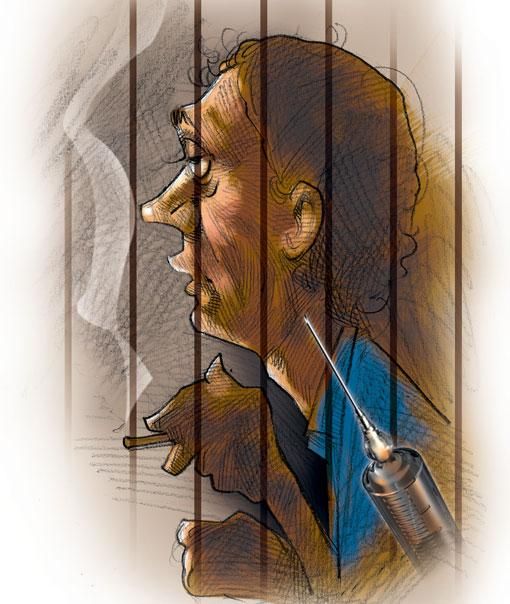Abu Dhabi: Ending up in jail three times did not stop Ahmad A.W. from taking drugs; he never intended on quitting the habit until he was told that he was infected with HIV.
In an exclusive interview with Gulf News at an HIV/AIDS workshop called Break the Silence, Ahmad opened up about his journey with drugs which led to HIV only nine months ago.
Ahmad, who's now 35, and two of his brothers were all addicted to heroin.
"My father was a strict school principal. He used to hit us hard when we were children; that shattered my confidence and caused a lot of fear within me," he said, crying.
At the age of 13, Ahmad tried heroin for the first time. "I dropped out of school shortly after that. Drugs made me less scared."
By the time he was 18, his addiction grew and he needed more money.
"I started to deal in drugs and eventually travelled to Thailand and smuggled 90 grams of heroin into Bahrain. I was stopped at the airport and directly sent to the police station."
His father managed to get him out of jail after six months, but that didn't stop him. He continued to deal in drugs and went to jail a second time when he was 24 and a third time when he was 28.
"I managed to smuggle drugs in jail, I couldn't stop the habit, and didn't want to. When I went back home and ran out of heroin, I used to steal my mothers diabetic pills, melt them, and use them as a substitute, that's how desperate I was," he explained.
He shortly got married and had a baby who died before delivery.
"My wife used to see the syringes at home, but I would find excuses to lie at her about my addiction."
In spite of six law suits and seven trips to rehab, his habit continued.
Suicide attempts
"After 20 years of addiction, I should have been dead a long time ago. The one thing that made me wake up from the darkness I was living in was when I was told I had HIV, that's when my life changed."
During his stay in rehab a year ago, Ahmad's doctor took him to a room and privately broke the news.
"Once she told me I had HIV I turned violent, I wanted to break the table in front of me. I stormed out of the room and instantly tried to commit suicide, which I attempted to do several times before."
While looking at himself in the mirror he started to weep like a child.
"So many thoughts crossed my mind. But something happened right there, I suddenly gained the power to quit what I find more serious than the condition I had, which is drugs."
Nurses, peers and even doctors started to treat him differently. "I was kept isolated in a room. Nurses were scared to approach me, friends wouldn't get close to me, I felt awful."
From then on, he refused to take tranquilisers, pain killers and any tablets subscribed to him in rehab.
"I decided to be drug free and regained an inner strength! I directly went back home and faced my wife, who's luckily not infected with the condition and we now live the happiest days of our lives and are moving on."
Trying for baby
Ahmad and his supportive wife are now trying to conceive a child but still remain practicing safe sex, until doctors confirm it's safe to do otherwise.
"I just want people to understand that there is hope. If you're addicted to drugs, get help, follow the 12 NA steps, and live day by day," he said.
Even though society does not accept his condition, Ahmad continues to travel and speak up about his experience. "I met so many woman and children infected with HIV and they are living normal lives."
Dr Ehab Al Kharrat, Senior Programme Advisor for HIV/AIDS at the United Nations Development Programme told Gulf News that people living with HIV are not dangerous to society. "Your co-worker can have HIV and you wouldn't even notice it," said Dr Al Kharrat.
"They look perfectly normal, and they should be allowed to have jobs and be treated like others."
Even though less than one per cent of the UAE population is infected with HIV/AIDS, confirmed Al Kharrat, sharing needles and unsafe sex remains a concern. "Since 2003 we have received reports of people being deported from the UAE due to testing positive for HIV," the Dr said.
There are currently 28 different medications for people living with HIV, out of which a combination of three is only needed to help raise immunity and prolong life expectancy.
"I hope to see a law that protects people with HIV," affirm Dr Al Kharrat.
"The condition is not contagious through saliva or fluids and people should treat those with HIV normally. In Ahmad's case, once the number of viral copies are low and undetectable in his blood and semen, he will be able to conceive a child and live a healthy life as long as he exercises, eats the proper food and continues to receive support from those around him," concluded the doctor.
The real thing
It is possible to avoid an HIV infection through an antiretroviral medication (ARVs) known as Post-exposure prophylaxis (or PEP) if taken from 24 - 48 hours after exposure to HIV.
Facts and figures about HIV/AIDS
- 50 per cent of infected people in the Middle East are woman
- 80 per cent are infected with HIV/AIDS through legal marriage
- 39.5 million people across the world as of the end of 2006 live with AIDS
- 2.9 million deaths from HIV/AIDS have been reported since the end of 2006
- 90 per cent of people don't know they live with HIV (of which 5 per cent are from the Middle East)
- Females are three times more prone to contracting HIV than men













